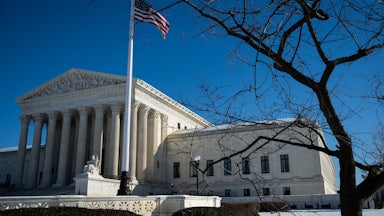When a foreclosed home is sold to pay off debts in most states, whatever equity is left over after satisfying the debts is returned to the owner. But this is not the case everywhere: Minnesota, Nebraska, and roughly a dozen other states instead allow counties and, in some cases, private investors to keep the surplus. Two families now hope to persuade the Supreme Court that these types of seizures, known as surplus-retention seizures, are unconstitutional.
One of the cases, Tyler v. Hennepin County, involves a 93-year-old woman who moved out of her condo in Minnesota and into a senior-living apartment in 2010. After Geraldine Tyler failed to pay property taxes on it for five years, Hennepin County seized it and sold it following a foreclosure process for $40,000. The county had sought to recoup $15,000 in taxes, interest, and penalties that she owed. After the sale, it kept the $15,000 it was owed—as well as the other $25,000 in equity that Tyler had built up, leaving her with nothing.
Tyler’s lawyers argued in the lower courts that two different constitutional provisions should allow her to keep the rest of her condo’s value. One of them, the Excessive Fines Clause, is fairly self-explanatory: It theoretically bars the government from imposing excessive fines upon Americans. The other provision, the Takings Clause, generally requires the government to provide “just compensation” when taking private property for public uses.
“The County unconstitutionally kept money to which it is not entitled,” Tyler told the justices in her petition for review. “The moment a tax collector collects what he is owed, his power to take property is exhausted. Thus, the law traditionally imposes a duty on government when collecting taxes or a debt to sell seized property fairly and refund to the former owner any surplus profits after recovering what it is owed and paying any other liens. By abandoning this traditional duty, and instead taking a windfall at Tyler’s expense, Hennepin County effected an uncompensated taking or excessive fine.”
In its reply brief, Minnesota adopted the strange argument that Tyler cannot challenge the decision to keep the surplus value of Tyler’s property because, under Minnesota law, it was no longer her property at that point. “[Tyler] makes much of the fact that the County sold her condo for a sum that exceeded the tax debt,” the state argued. “But she ignores the fact that the sale proceeds she claims arise from the resale of the condo, after the redemption period had expired and the County was left to do something with the property. After state law had extinguished any interest Petitioner once had, the County was tasked with returning the property to productive use and chose to sell it.”
That’s … exactly Tyler’s point? She argued that the state sold her property to satisfy a debt and did not give her back the surplus proceeds of the sale, and Minnesota essentially responded by saying, “Well, actually, first we said it was no longer your property, and then we sold it and didn’t give the surplus equity back to you.” Pointing to pre-1776 English law and early American property practices did not persuade the Eighth Circuit Court of Appeals, which sided with the state of Minnesota. Nor, as you might expect, did it persuade Minnesota itself, which dismissed the evidence of a property-right tradition out of hand.
The other case, Fair v. Continental Resources, is from Nebraska. Kevin and Terry Fair failed to pay just over $500 in property taxes for 2014 after Kevin was diagnosed with multiple sclerosis, forcing him out of work and sharply raising their medical costs. Without notifying the Fairs, Scotts Bluff County sold a lien on their $60,000 property to Continental Resources, an oil and natural gas company, which began paying property taxes on it for the next two years. In 2018, after three years of silence, the county demanded $5,200—the original 2014 penalty plus interest and penalties—and then transferred the house’s deed to Continental when the Fairs couldn’t pay it.
In their petition for review, the Fairs emphasized that Nebraska generally does not allow surplus-retention seizures for other types of debt, like mortgage foreclosures or enforcement of court judgments. “But under Nebraska’s tax foreclosure statute, Scotts Bluff County extinguished Mr. Fair’s interest in his home by conveying full title to Continental without any ability for Mr. Fair to recover his equity,” they told the justices. Like Tyler, they pointed to a range of historical practices and patterns to show that Nebraska was an anomaly under the common law.
Both Minnesota and Nebraska pointed to a contradictory statement in Nelson v. City of New York, a 1956 case where the Supreme Court sided with New York City after it seized parcels for unpaid water bills that stemmed from a bookkeeper’s failures. Though it was not the central issue in that case, the justices wrote that there was nothing constitutionally improper about the city retaining the surplus proceeds when it had “properly notified” the owners about the charges and the foreclosure proceedings.
“Despite this Court’s decisions recognizing that debtors retain ownership of the surplus value of property taken in debt collection, federal and state courts conflict about whether government may confiscate more than it is owed when collecting a debt,” the Fairs argued. They described the court’s mention of surplus proceeds in Nelson as “dicta,” meaning that it was not central to the court’s holding and therefore not binding precedent for future court. “Confusion about Nelson will persist and individuals in some jurisdictions will have no recourse to vindicate their constitutional rights unless this Court grants the petition and settles the issue.”
Nebraska and Continental Resources urged the court to reject these arguments outright in their joint reply brief. They reject the Excessive Fines Clause claim in short order by noting that the seizures were “remedial” instead of “punitive,” meaning that they weren’t levied as part of a criminal sentence. On the Takings Clause claim, they fell back to the court’s mentions in Nelson to support their contention that they can seize someone’s property to satisfy a debt, then pocket any remaining equity for themselves.
As Minnesota did in the Tyler case, Nebraska and Continental also stated that, yes, Continental kept the surplus proceeds from the seizure, and yes, they can get away with it because they gave the Fairs 90 days’ notice first. “This notice enables landowners who want to retain the property’s surplus value—the property’s value minus the taxes and fees owed—to sell the property, satisfy the delinquent taxes, and keep the surplus proceeds,” the state and the company claimed. “Kevin L. Fair did not do that here. Rather, he argues that the Takings Clause of the United States Constitution forces the State to do it for him.”
Again: Yeah, that’s the point. I do not normally write about local property tax disputes, even when they reach the Supreme Court. Nor is it clear whether the justices will take up these particular cases. Both states argued that there is no real circuit split in the lower courts—the two families disagree on that point—and that its intervention might have federalism implications. But I am still struck by the blitheness of the argument laid out by two states in two different legal proceedings: Yes, we seized these people’s homes to recoup part of their value in property taxes, and then we kept the rest of their home equity or gave it to someone else just because we could. That seems hard to reconcile with the Takings Clause’s purpose, even if one of the court’s past decisions suggested otherwise.










